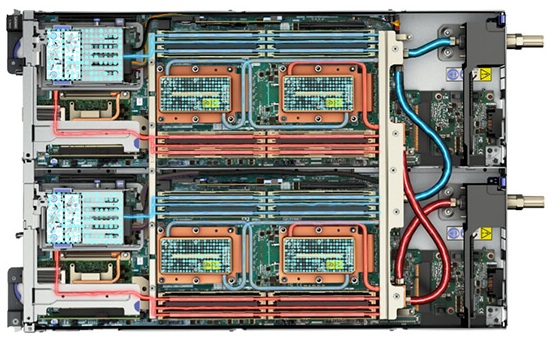Lenovo announced today that it is supplying a new high performance computer to the Max Planck Society, one of Germany’s premier research organizations. Comprised of Intel Xeon processors and Nvidia A100 GPUs, and featuring Lenovo’s Neptune liquid cooling technology, the system will be operated by the Max Planck Computing and Data Facility (MPCDF). The €20 million contract with Lenovo includes the complete HPC system as well as operational and support services.
Installation began in May at Max Planck’s Garching facility near Munich; commissioning for the final system is expected to be completed in early 2021.
Lenovo did not disclose performance targets for the new system, but indicated it will significantly outperform an existing computing resource, installed in 2018. Supplied by Bull Atos, that system, called Cobra, delivers 5.6 Linpack petaflops, owing to 3,200 Intel Skylake nodes. It is currently number 44 on the Top500. A GPU partition spans 64 V100 (2x) nodes and 120 RTX5000 (2x) nodes.

The new contract strengthens ties with Lenovo, which supplied the Max Planck Society with its Draco system, the predecessor of Cobra. “This [new] system brings MPCDF back home to us!” said Lenovo’s Scott Tease, general manager, worldwide HPC and AI business. Tease added that in addition to main systems, a number of other clusters at the Max Planck institutes were provided by Lenovo.
Draco was installed in May 2016 at the MPCDF. The system consists of about 880 Haswell nodes, 106 of which are equipped with two PNY GTX980 GPUs. A 2017 upgrade added 64 Broadwell nodes. Benchmarked at 790.7 Linpack teraflops, Draco reached the 160th spot on the November 2016 Top500 list.
The forthcoming system, as yet not publicly named, leverages Lenovo’s Neptune two-stage cooling infrastructure. “Unlike its predecessor, Max-Planck’s new HPC cluster is water-cooled in two stages,” noted Lenovo. “During the first stage, all essential components of the boards are directly cooled with liquid circulated copper piping. The second stage additionally cools the entire racks using the Lenovo Rear Door Heat Exchanger (water-cooled rear doors) in order to dissipate 100% of the so-called convection waste heat into the water.”

“This cooling process reduces energy consumption considerably and allows the processors to work at their optimal operating point. Moreover, the two-stage cooling concept significantly increases the overall energy efficiency of the cooling system: no heat is dissipated into the ambient air of the data center, which in turn reduces the energy required to keep it cool,” the company added.
Dr. Hermann Lederer from the Max Planck Computing and Data Facility (MPCDF), commented, “What is impressive is the combination of the high performance of the overall system, with its high energy efficiency and high compactness, direct water cooling, low space and infrastructure requirements and high levels of service for both system and application support.”
Lenovo indicated that work on the project is underway. A subsystem is going into operation this summer and full deployment is scheduled for early 2021. The company disclosed the final system will be equipped with “the latest Intel CPUs and a corresponding proportion of Nvidia A100 GPUs,” however no additional system details were made available at this time.
Lenovo enjoys a healthy position in the high-end computing space with industry analysts placing the company within the top five HPC vendors by server market share. Lenovo also retains its number-one position on the Top500 list with 180 systems. While the majority of these are loosely-coupled Web-scale IT machines, notable supercomputing installments include SuperMUC-NG at Leibniz Rechenzentrum in Germany (#13), Marconi at CINECA in Italy (#22), and MareNostrum, installed at the vaulted Barcelona Supercomputing Center in Spain (#37), which you can now tour virtually.
Header image, credit Max Planck Computing and Data Facility (MPCDF).



























































